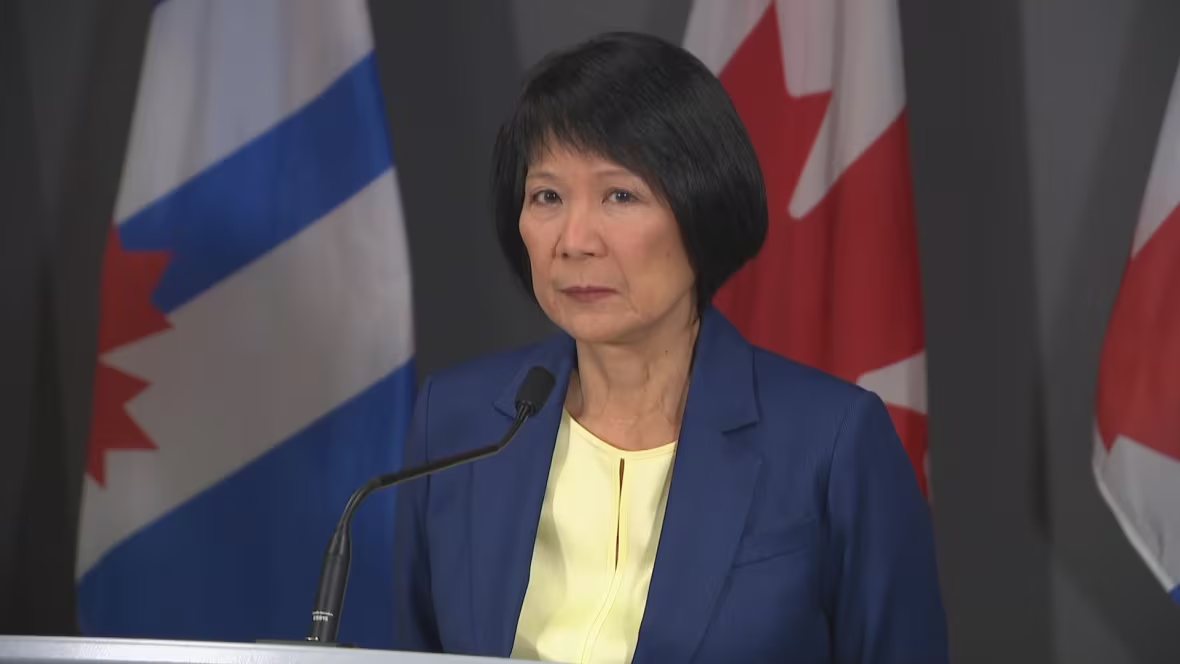Toronto city council passes plan to entice developers to build rental homes
Plan would see the city offer monetary incentives to private developers

Toronto city council has approved a plan to support the building of 20,000 new rental homes in the city.
The plan, approved Wednesday by a vote of 23 to 1, would see the city offer monetary incentives to private developers to build rental housing. The incentives include a deferral of development charges, a property tax reduction and foregone taxes and fees for affordable rental units.
Toronto Mayor Olivia Chow told reporters before the vote that rental housing is desperately needed in the city because of the housing crisis. She said 50 per cent of Toronto residents are renters. She said the city met with builders last week to discuss the plan.
"We need to build more rental homes now," Chow said.
"We can't afford to have the housing pipeline dry up because of the difficult market conditions. We need to see these rental homes built, and we will work with the industry to make it happen."
Under the plan's first phase, the city has committed to building 7,000 rental homes through its own resources. Under the second phase, the city would call on the provincial and federal governments to provide funding to support the building of 13,000 rental homes.
To roll out the first phase, the city said it would immediately call for applications to approve 7,000 new rental homes, which would include 5,600 purpose-built rental homes and at least 1,400 affordable rental homes.

Coun. Gord Perks, chair of the council's planning and housing committee, said he expects a flood of applications from builders.
"We're taking a bit of a risk and going out by ourselves. Municipal governments typically don't pay for affordable housing. That first phase, I think, is going to be oversubscribed. I think it will sell out almost as fast as a Taylor Swift concert," Perks said.
"The second phase is the one that really starts to deliver in bulk and that's going to require the federal and provincial governments to wake up and realize that people need places to live and to provide the money to make that happen."
Incentives too 'mild,' says councillor
But Coun. Brad Bradford, vice chair of the planning and housing committee, said developers have already said the rules to qualify for the funding are too restrictive.
"The feedback has actually been very clear. The incentives proposed are not enough. It's mild. It's meek. It's inadequate to unstick the 29,000 to 37,000 housing units that are approved and sitting on the sidelines, stuck in the pipeline," Bradford said.

Coun. Stephen Holyday voted against the plan, saying spending taxpayer dollars on incentives doesn't guarantee success and the money could be spent elsewhere to improve city parks and roads.
"This is a cost of hundreds of millions of dollars to the taxpayers, an enormous strain on our ability to deliver the important infrastructure in the city that you see all around you."
Staff will report back to council in December on which projects have been awarded the funding.
In a news release, the city said eligible projects will receive city incentives of:
- An indefinite deferral of development charges on purpose-built rental homes, estimated at $37,636 per unit, as long as the development continues to be rental housing.
- A recommended 15 per cent property tax reduction for 35 years estimated at a total of $20,396 per purpose-built rental unit.
- Full financial incentives, including foregone taxes and fees for affordable rental units, estimated at $97,264 per unit.
To qualify for the incentives, projects will need to include at least 20 per cent of units as affordable rental homes, which meet the city's new income-based definition of affordable housing, for a period of up to 99 years and for at least 40 years.
Projects will also have to begin construction by the end of 2026.
With files from Shawn Jeffords and Muriel Draaisma